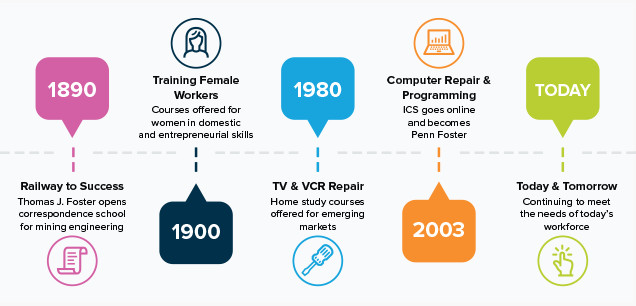As posted on FosterEDU blog
Since the 2013 State of the Union address, the Department of Education has renewed emphasis on programs that prepare students with the skills employers demand, particularly in science, technology, engineering and math.1 The department’s 2015 budget reflects this priority, with $170 million earmarked for programs that prepare students for STEM-related careers.2 While this policy is new, the principle is not. Promoting career skills has been the mission of Penn Foster for over a century, ever since Thomas J. Foster opened a correspondence school to teach mining engineering to mine workers in 1890.
Railway to Success
Following the 1862 Pacific Railroad Act, the American railroad system grew rapidly, soon linking New York to San Francisco. Coal mining expanded with the railroad industry, with production swelling from 7,018,181 tons in 1850 to 157,770,963 in 1890.3
With this expansion came safety issues. Concerned about mining accidents, Pennsylvania newspaper publisher Thomas J. Foster began using his paper as a correspondence course to help miners train for industry safety tests.4 Foster initially taught mining engineering principles, but his method proved effective for other applications of engineering and related topics such as industrial drafting. In 1890 he opened what became known as the International Correspondence Schools (ICS). By the turn of the century, ICS was teaching over forty areas of engineering, along with English, commercial education, and ornamental design, to over 190,000 students.
As ICS grew, it continued developing innovative ways to serve the needs created by America’s expanding railroad industry. The school’s railroad training department set up railroad cars to serve as live training labs. Railroad companies began sending their employees to ICS to learn.
Training Female Workers
Meanwhile, more women were entering the workplace. The 1900 Census showed that approximately 1 in 5 women were now engaged in gainful employment.5 To serve the female labor force, fashion expert Mary Brooks Picken partnered with ICS to open the Women’s Domestic Institute.6 The Institute taught women domestic skills such as sewing that were also in demand in industry, along with entrepreneurial skills. Enrollment eventually grew to nearly 300,000 women. Nearly one in five of these planned to open their own business.7
TV and VCR Repair
The dawn of television created new economic needs and opportunities. By the mid-1980s, 82 percent of Americans watched television daily,8 and VCRs, on the market for a decade, were doubling in sales annually, reaching 11.5 million sales in 1985.9 Even in 2014, Gallup polls showed 58 percent of Americans still had VCRs.10 To transform these emerging markets into economic opportunities for Americans, ICS ran a series of commercials featuring celebrities such as Sally Struthers offering home study courses in TV and VCR repair.11
Computer Repair and Programming
Meanwhile computer sales were also surging. By 1984, PC sales had passed 1 million a year, to reach 100 million a year by 2000.12 Once again ICS encouraged Americans to seize the opportunity, offering courses in computer repair and programming. Since ICS went online to become Penn Foster Career School in 2003, it has continued to bring workers the skills today’s economy demands.
Today and Tomorrow
Today the school offers a full range of courses in high-demand areas, including auto repair, business management, and medical transcription and administration.13 Penn Foster’s top programs offer training for relevant workforce skills for the most in-demand fields of today’s economy. Striving to provide students access to a quality education where it is needed most, Penn Foster partners with youth organizations, career colleges, high school districts, and employers to deliver flexible education options for non-traditional students. Whether students are looking to earn their high school diploma, college degree, career certificate, or get help with preparing for certifications or credentials, Penn Foster offers a diverse and practical variety of educational options for every student. No matter how the economy changes, Penn Foster remains constantly committed to helping its students succeed.

